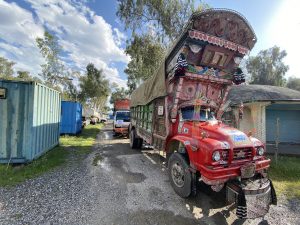
UNHCR loading core relief items into trucks for dispatch and distribution. Photo credit: ©UNHCR/Haider Habib Khan
Press release
ISLAMABAD, 6 April 2020 – UNHCR, the UN Refugee Agency appreciated the Government of Pakistan’s efforts to include all vulnerable individuals regardless of their nationality or status in its multi-layered response to the COVID-19 pandemic.
“UNHCR welcomes the recent directives of Prime Minister Imran Khan to include the most vulnerable internally displaced people and Afghan refugees in the overall relief assistance and support schemes,” said UNHCR Deputy Representative, Mr. Iain Hall. He added that when confined to their villages and homes due to the coronavirus pandemic, many people are unable to meet even their most basic needs.
Mr. Hall highlighted some of the tangible support that UNHCR has been providing to the Government for ongoing COVID-19 interventions in health, water and sanitation, and outreach to the most vulnerable communities.

UNHCR loading core relief items into trucks for dispatch and distribution. Photo credit: ©UNHCR/Haider Habib Khan
UNHCR has provided 10 fully equipped ambulances and 28 large housing unit facilities to the provincial Health Departments and the Provincial Disaster Management Authorities in Balochistan, Khyber Pakhtunkhwa and Punjab. UNHCR has also provided large Rubb halls to support isolation facilities being established by the Balochistan Government.
In addition, the UN Refugee Agency has distributed medical supplies, personal protective equipment and sanitation products, such as sanitary clothes, soap and disinfectants, and other relief items to rural health facilities in support of refugees and their host communities in Pakistan.
At this difficult time, UNHCR is also reaching out to communities to disseminate critical public health information. Last week, the UN Refugee Agency announced a Rs.1,000 mobile top-up for each of its 3,000 Outreach Volunteers and community mobilizers across the country to strengthen digital communication. This support will assist in further transmitting information on COVID-19 while following the Government’s directives on social distancing.
UNHCR, together with the Ministry of SAFRON/Commissionerate for Afghan Refugees and NGO partners, are in the process of upgrading water and sanitation facilities in the health centres and schools in refugee villages across the country.
ENDS
Share on Facebook Share on Twitter